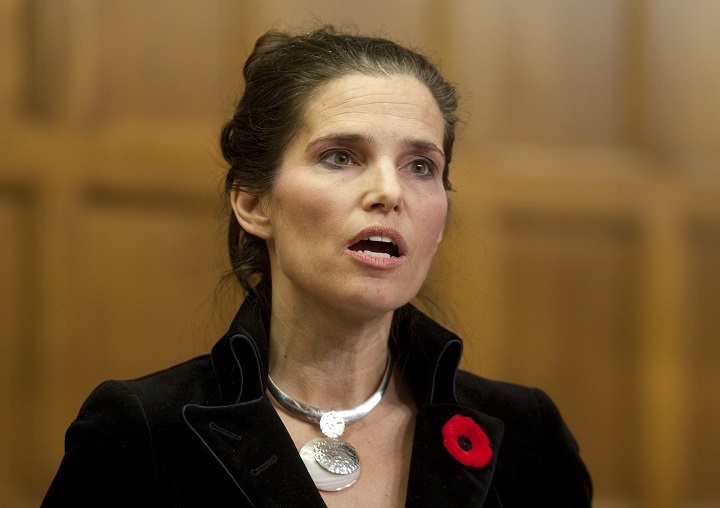UPDATE: Five hours after publication of this story, Minister Kirsty Duncan announced the government will continue funding the CNIB’s production of accessible and alternate-format books.

Prime Minister Justin Trudeau’s Liberal government has decided it will no longer fund the production of accessible books for blind and vision-impaired Canadians, Global News has learned.
Starting April 1, the Canadian National Institute for the Blind (CNIB), which is Canada’s largest producer of accessible and alternate-format books, will no longer receive government funding for converting conventional books into accessible formats. The news comes nine days before the CNIB is set to celebrate its 100th anniversary.
“This lack of funding will force CNIB to decommission our accessible book production operations effective April 1, 2018 – unless something is done,” he wrote.
READ MORE: People with disabilities lose hopes, skills in psychiatric hospital, inquiry told
Over the past five years, Conservative and Liberal governments have provided the CNIB with roughly $2.1 million a year to make braille, audio and other types of accessible books. An additional $13 million was provided between 2005 and 2011 to convert analog accessible books into digital format.
WATCH: Disability advocates say housing for those with intellectual disabilities is in crisis

On average, the CNIB converts 2,000 new titles a year. They also transform roughly 5,000 previously converted books into other accessible formats. According to the Centre for Equitable Library Access, which distributes the books produced by the CNIB, more than 2.1 million copies of these books were borrowed, sent or downloaded in Canada during the past year.
“It’s sadly ironic that a budget titled ‘Equality + Growth’ actually puts up a fundamental barrier to equality and growth for print-disabled Canadians,” wrote Rafferty.
“Canadians with print disabilities already face tremendous inequality when it comes to accessing books and information, with only a fraction of published works available in formats they can read.”
According to the CNIB, less than seven per cent of published materials are available in accessible formats in Canada. This figure is less than one per cent in developing countries around the world, they say.
Even the budget document wasn’t accessible
Diane Bergeron is the CNIB’s vice president of engagement and international affairs. She’s also blind and an avid reader of accessible books.
Like hundreds of other people, she showed up at the government’s budget announcement on Feb. 27 to find out what — if any — funding her organization would receive. But unlike most people in the room, she couldn’t read the budget document she was handed. That’s because the government made a “mistake” and either forgot or didn’t bother to produce an accessible version of the budget as she had requested two weeks earlier.
“As a person who’s blind, I should have the right to access that material,” Bergeron said.
And she does have that right. The government’s own policy states any materials made available to the public must also be provided in accessible formats upon request.
READ MORE: Canadian GDP stands to gain $17B by 2030 by improving disability access: report
Bergeron says not having the budget in an accessible format on budget day was embarrassing and demeaning. It’s a perfect example of why people with disabilities lag behind when it comes to employment, she says. As a woman with a disability working to make Canadian society more equal, she expected a government so keen to promote equality would have at least provide her with the basic materials needed to do her job.
“They locked the doors and I was not provided with an accessible format,” Bergeron said.
The only thing that made this worse, she said, was the realization the government had eliminated funding to the CNIB’s book program. That and the fact someone had to read her the news.
Without government funding, Bergeron says the CNIB can only convert as many books as fundraising allows. But having to resort to charity for something that’s a fundamental right isn’t acceptable, she says.
“My literacy should not depend on how many tickets we’ve sold to a golf tournament,” Bergeron said.
As for the mix-up, a spokesperson for the finance department says a mistake was made and that “human error” caused the problem. They say they’re sorry, that they’re working with officials to see what went wrong, and that clearly they “need to do better.”
Conservative MP says Liberals walking away from treaty obligations
In 2016, Canada agreed to join the Marrakesh Treaty, an international agreement that makes it easier to share accessible books around the world by limiting certain copyright restrictions. The agreement also urges countries to produce more accessible materials with the aim of sharing them internationally.
Although the treaty was a priority for the previous Conservative government, it wasn’t until after the election of Trudeau’s Liberals that it was signed into law.
WATCH: Accessibility still an issue at Toronto Coach Terminal

Conservative MP Pierre Poilievre worked on the treaty before his government was defeated in October 2015. He thinks ratifying the agreement was a big step for accessibility in Canada, but says it now appears the government is walking away from its obligations.
“I gave the government credit when they took the Marrakesh Treaty over the finish line,” Poilievre said. “But if we’re not contributing our part, then we’re not keeping up to our end of the agreement.”
READ MORE: MPs tell Trudeau to scrap ‘discriminatory’ immigration law
Poilievre says the government should reverse its decision. He also thinks it’s outrageous a budget which contained tens of billions in new spending didn’t have room for $3 million to the help the CNIB, an amount he says is equal to a rounding error for the federal government.
“There’s a book drought for blind and visually-impaired people,” Poilievre said. “They’re deprived of many of the books we take for granted.”
“Visually-impaired Canadians from across all of Canada were asking for half as much money as the Trudeau Liberals spent on a hockey rink on Parliament Hill,” he said.
WATCH: University prof fears she could be forced to leave Canada because of son’s disability

Meanwhile, a statement provided by the office of Kirsty Duncan, Minister of Sport and Persons with Disabilities, says the government is working closely with CNIB to develop a long-term strategy for creating accessible materials The statement said this is a “priority” and that the CNIB has received roughly $19 million in government funds in the past.
Missing from this statement, however, was part of a paragraph included in a nearly identical memo obtained by Global News that was sent from Duncan’s department to all Liberal MPs earlier this week.
Meanwhile, Bergeron says if the government is serious about accessibility it will reverse its decision and reinstate the funding. She’s also written Finance Minister Bill Morneau a letter requesting a personal apology for the budget day mishap.
“Giving a blind person an inaccessible document is like telling somebody who uses a wheelchair, ‘You don’t need to worry about the stairs, you can use the escalator,’” she said.
- Freeland set to table 2024 federal budget in the House of Commons
- All a-boot tradition: A look at finance ministers’ budget shoes through the years
- Inflation ticked higher in March. Are Bank of Canada rate cuts still in the cards?
- Food service strike: Air Canada, WestJet refine menus at Toronto Pearson




Comments